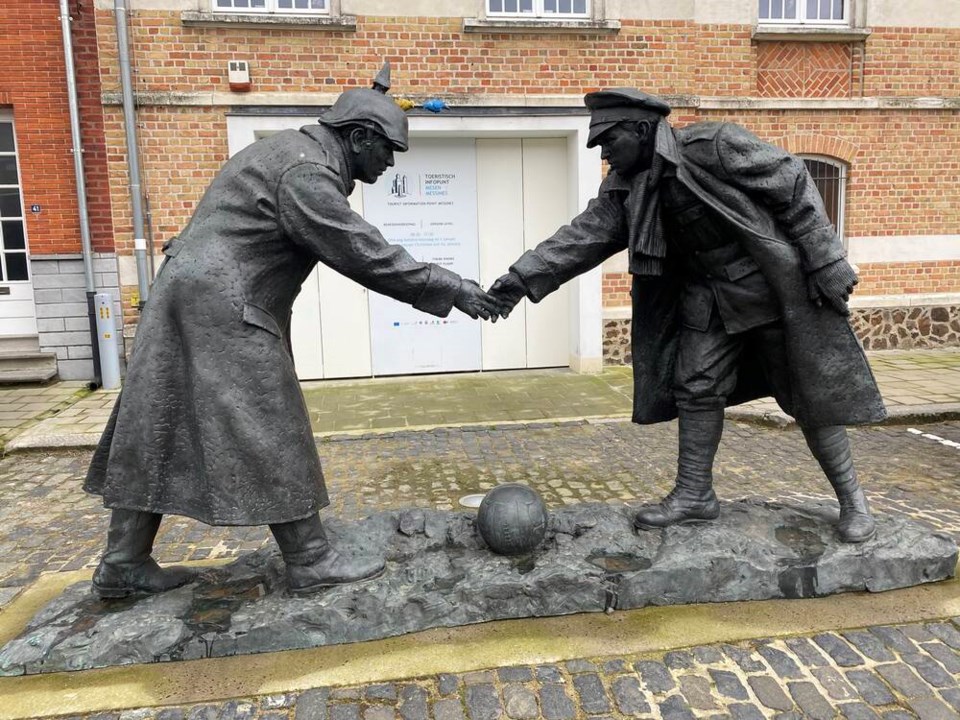Call me an idealist. Go ahead — I’ve been called worse and rejoice in the title.
As a new grandfather, I’ve seen the wonder of Christmas restored: a small child mesmerized by a tree festooned with 40 years of memories, a cheerful dining table laden with turkey and tourtiere surrounded by friends, and the national and international news absolutely banned until after Boxing Day.
So you’ll have to forgive me for digging out what I have always thought to be the quintessential Christmas story — the one about the First World War and the 1914 Christmas “truce.”
If ever there was a time to repeat this story, it’s now.
It’s a story about hope and humanity, substantially based on a 1914 Christmas Day letter written by Brig.-Gen. Walter Congreve, commander of the 18th Infantry Brigade stationed near Neuve Chapelle in the Artois region of France.
The British papers published numerous first-hand accounts from soldiers in the field, taken from letters home to their families, and editorials on “one of the greatest surprises of a surprising war”
The First World War had been raging for only four months. According to soldiers’ accounts, the weather that December was cold and wet. Many of the trenches were continually flooded, soldiers were covered in mud and exposed to frostbite.
Congreve’s letter, substantiated by many other first-hand accounts of the incident, described how the Germans declared a truce for Christmas Day.
Roughly 100,000 British and German troops were involved in the informal truce along the Western Front.
On Christmas Eve, the Germans placed candles on their trenches then continued the celebration by singing Christmas carols. The British responded by singing carols of their own.
One of Congreve’s men bravely lifted his head above the trench and climbed out as others from both sides walked carefully onto no man’s land toward each other.
Officers and men shook hands and exchanged cigarettes and cigars. One of Congreve’s captains “smoked a cigar with the best shot in the German army,” the latter no more than 18 years old.
Henry Williamson, a 19-year-old private in the London Rifle Brigade, wrote to his mother on Boxing Day: “Dear Mother, I am writing from the trenches. It is 11 o’clock in the morning. Yesterday the British & Germans met & shook hands in the ground between the trenches, & exchanged souvenirs. Yes, all day Xmas day, and as I write. Marvellous, isn’t it?”
Capt. Robert Miles of the King’s Shropshire Light Infantry recalled that Christmas Day in a letter published in the Daily Mail in January 1915: “We are having the most extraordinary Christmas Day imaginable. A sort of unarranged and quite unauthorized but perfectly understood and scrupulously observed truce exists between us and our friends in front.”
A German lieutenant, Johannes Niemann, wrote: “grabbed my binoculars and looking cautiously over the parapet saw the incredible sight of our soldiers exchanging cigarettes, schnapps and chocolate with the enemy.”
Many accounts of the truce involve one or more soccer matches played in no man’s land. Some accounts of the game included elements of fiction, such as the one by Robert Graves, a British poet and writer (and an officer on the front at the time) who reconstructed the encounter in a story published in 1962. In Graves’s version, the score was 3-2 for the Germans.
The truth of the accounts — based substantially on the many Wikipedia sources used for this column — has been disputed by some historians, although there is general agreement that there were probably attempts by both sides to play soccer in no man’s land.
The game may have been just “kick-about” matches with “made-up footballs” such as a bully-beef tin.
Whatever the facts, the 1914 Christmas “truce” story provides us a fleeting vision of hope for humanity so needed in the midst of today’s daily diet of brutality and chaos.
I say a “fleeting vision” because in December 1915, orders by the Allied commanders to forestall any repeat of the previous Christmas truce dashed all hope for those in the trenches.
On the German side, a general order from Dec. 29, 1914 already forbade fraternization with the enemy, warning German troops that “every approach to the enemy … will be punished as treason”
An account by Thomas Vinciguerra published in the Christmas Day 2005 edition of the New York Times recounted the refusal by one German corporal of the 16th Bavarian Reserve Infantry to participate in any way in the truce.
His name was Adolf Hitler.
Geoff Johnson is a former superintendent of schools.



